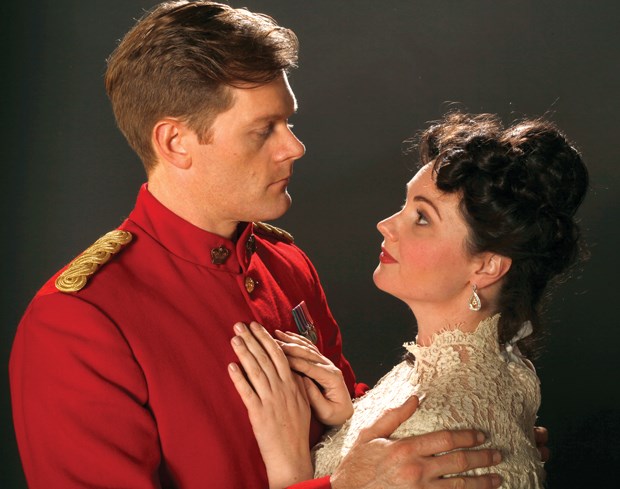Blackbird Theatre presents The Rivals, Dec. 28 to Jan. 23 at The Cultch, 1895 Venables St., Vancouver. Tickets start at $27, available at thecultch.com or by calling 604-251-1363.
“She’s as headstrong as an allegory on the banks of the Nile.”
Classic malapropisms like this one are plentiful in Blackbird Theatre’s production of The Rivals. The term “malapropism,” in fact, gets its name from Mrs. Malaprop, a character in the play who has the unfortunate (and hilarious) habit of using words incorrectly when describing people or events. Malapropisms, still a widely used term in modern language, are one of the play’s lasting legacies.
“You know what she means, you always know what she means,” says director Johnna Wright, when describing Mrs. Malaprop. “We tried to make up some malapropisms as a joke and it’s hard because it isn’t the right word – but you know what she’s getting at.”
The Rivals was first performed in London in 1775, the work of first-time playwright Richard Brinsley Sheridan, who was only 24 years old at the time. Despite the play’s age and the relative inexperience of its author, the show has endured a long and healthy stage life due to the comedy and wit by which Sheridan skewered his topics.
The play follows the exploits of a hopeless romantic named Lydia and an upper class gentleman named Jack. In an effort to win over Lydia’s desire for passionate, non-material love, Jack does the only sensible thing he can think of: He pretends to be poor. Along the way, a group of outrageous and over-the-top suitors compete for Lydia’s affection as well.
The play is a “comedy of manners,” a historically popular genre which uses scathing satire to comment on the social mores of the time. Wright’s production of the play, however, modernizes it without sacrificing the bawdy comedy that made it so uproarious when it was first performed at the end of the 18th century.
“We moved the time period forward to the early-20th century,” she says. “If you look at what people wore and how they behaved in the late-18th century, it’s very formal and very artificial. Nobody went out without a wig on, that whole kind of powdered wig look that you see, and I felt like I wanted it to be more relatable than that.”
Wright says if the setting wasn’t relatable it would have been too difficult for audiences to connect with the characters. “I wanted the characters to have some vulnerability, so I put them in an era where they would look more natural and behave more naturally,” she says.
The ensemble cast, which features veteran Canadian actress Gabrielle Rose as Mrs. Malaprop, have been able to exercise their comic chops within the play’s new contemporary setting. Wright adds that she thinks the cast has been having a blast during rehearsals. “Everyone in the show has their comic turn. There’s certainly some characters that are more ‘the heart’ of the play, but everybody has their moment where they get to show their comic skills, so I think they’re having a lot of fun,” she says.
Going beyond a mere good laugh, Wright’s direction emphasizes some bigger themes about the way people interact with one another. Gender, identity, and social standing are explored in a comedic yet perceptive manner in Wright’s skilled hands.
While some of the characters in the play behave “badly,” as Wright puts it, she also says Sheridan demonstrated love and care for his characters when he wrote them. Despite the fabrications the characters create, they are doing their best in a society where social standing is meant to be everything. A play as richly told as The Rivals is the kind of work that Wright is drawn to as a director.
“I want to do plays that have a generosity at their heart and this play really does – The Rivals does,” she says. Wright wants to direct shows “where you can love the people and see they are trying to connect to the other people, where the playwright is generous with the characters and loves them as well.”
The Rivals marks the 10th anniversary performance for Blackbird Theatre. The company’s focus is on classic plays, ancient or contemporary, and over the years they have put on major productions by the likes of Beckett, Chekhov, and Ibsen. Although Sheridan is a lesser-known playwright, Wright says this won’t hurt the reception of The Rivals. She says the play’s humour and the important questions it raises about how people present themselves is guaranteed to entice audiences.
“It is a story that still has meaning today,” she says. “To me, it’s about this question of pretense and when we’re pretending to be something we’re not, what do we lose?”



